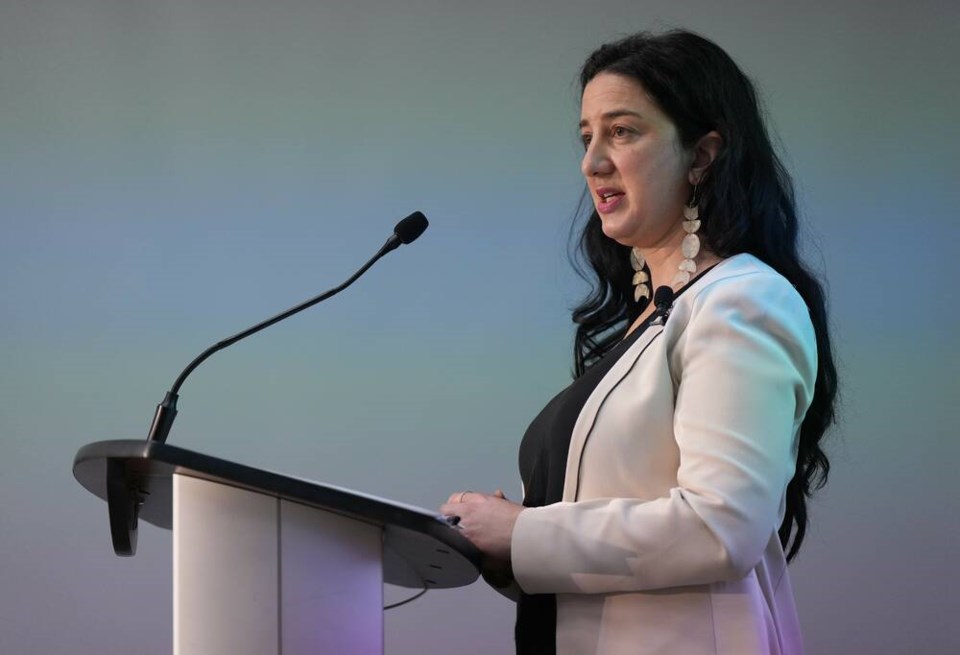When the Greater Victoria Board of Education issued a special invitation to B.C. Human Rights Commissioner Kasari Govender to speak at this week’s meeting, it got exactly what it wanted.
She validated the decision to shut down school police liaison programs, congratulated them and urged them to hold their ground until research shows the program is worthwhile.
The decision to bar police visits to schools except in emergencies created a sustained controversy that prompted the education ministry to order the board to produce a comprehensive safety plan, which has been submitted but not yet released.
After Govender’s appearance, board vice-chair Karin Kwan read parts of a Greater Victoria Teachers’ Association letter to the education ministry that called the safety plan directive “outrageous.”
The full letter from GVTA president Carolyn Howe, obtained by the Times Colonist, called the directive an “anti-democratic circumvention of local governance” and said the “alleged increase in gang violence is not something we see day to day in our schools…
“It is outrageous that police seemingly have a direct conduit to the Minister of Education while teachers… are routinely left unheard.”
Police have not produced any evidence of increased gang violence, she wrote.
Govender told the board her opposition to police liaison officers has been misrepresented and misunderstood. It is not ideological. “It’s simply a call for more information.”
The program should be assessed on real data, not by way of “hyperbole and moral panic,” she said.
Her starting point is that policy must be based on evidence to avoid biased stereotypes and systemic discrimination.
“We simply don’t have enough research on SPLO to say definitively whether they will keep our young people safe and thriving.”
She urged all school districts earlier to shut down the programs, “unless they can demonstrate an evidence-based need that cannot be met through any other means.”
It is unclear how many districts followed suit.
Govender said the “psychosocial and educational roles” of school police liaison officers should be reassigned to counsellors, coaches and extracurricular support staff.
“The funds and resources which would otherwise go to SPLO programs should be redirected to civilians…”
That would not hinder valid investigations or responses to criminal activities, she said.
What is in question is having armed, uniformed officers in schools simply to build relationships with children and youth, she said.
Govender released a more general study three years ago that cited systemic racism in certain B.C. policing practices. Although she acknowledged criticism of relying on U.S. studies, she cited a U.S. study that found systemic racism in SPLO programs there. She said it concluded that U.S. officers criminalized common student indiscretions and left them feeling they are under constant surveillance.
Her repeated requests to the province to start research here have been refused, she said.
Victoria Police Chief Del Manak told a meeting of concerned parents last week at Spectrum School that police cannot solve all the problems children are dealing with.
“But we are an important tool in the toolbox used to ensure student safety.”
He said he personally disagrees with Govender’s position.
“I respect the role of the commissioner, but frankly, when you are using flawed data or U.S. statistics — we are a different country than the USA.”
Just So You Know: The board protocol normally gives people five minutes to speak at its online-only meetings.
Mia Golden, an experienced youth counsellor in Greater Victoria, delivered a passionate brief to the board last May in favour of SPLO, saying there is a sharp increase in gang activity and children in crisis. The board’s stance is indoctrinating students in the belief that police are “villains,” she said.
She invited questions because “there is so much at stake,” but was cut off seconds after the five-minute mark. A few perfunctory questions were asked later.
Lori Poppe, an ardent advocate for police liaison officers, asked in May to present “victim impact statements” from families who have been affected by gang issues and who support SPLO as a means of addressing those concerns.
The board denied her permission because “the content of the presentation is not appropriate for sharing in a public board meeting.”
Govender spoke for about 16 minutes and fielded supportive questions from the board for another 14 minutes.



